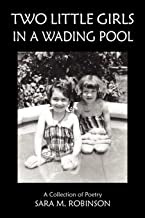Sara M. Robinson
In search of the perfect, or at least the ideal, poetic line. I don’t know about any other poets, but I am in search of “the line of all lines.” I can’t describe it for you, but like my search for the perfect onion ring, I’ll know it when I see it.
Some time back, in one of my earlier Southern Writers columns, I wrote about the line in poetry. A quick review: The line in poetry is simply composed, but complex in its action. How’s that for possible confusion. Let’s take a look at some brief poetry lines and see how this works. In his poem, “In a Station of the Metro,” Ezra Pound gave us these amazing lines: “The apparition of these faces in the crowd: / Petals on a wet, black bough.” Many critics would argue that these two lines are among the best ever written. The metaphor and imagery are key here. So, we know something more about a poetic line: It should contain metaphor; and it should conjure up images for our minds to latch onto. This poem, The Red Wheelbarrow, by William Carlos Williams is another example: “so much depends/ upon / a red wheel / barrow / glazed with rain / water / beside the white / chickens.” He wants us to take each line, each single word, slowly and thoughtfully. Amazing. Here’s one of mine, from the poem, The Root of Faults. “Mountain of no roots / slips ledge by ledge / bench by bench / into the bitter water” //…
What about length or number of words? As we can see above perhaps brief is better, but there has to be meaning. There is a poetic line in the Bible that is considered the shortest line in the Book: “Jesus Wept.” Two words that for many speak volumes. The greatest mistress of the short, but powerful, poetic line is Emily Dickinson. It is hard for me to pick one out, but here is one that certainly is representative of her talent: “I dwell in possibility— / A fairer house than Prose— /” … The vastness of that initial line offers unlimited options for her “house” which stands in as a metaphor for her poetry.
Another key element in the line is making inanimate objects life-like. Again from Ms. Dickinson, “The duties of the Wind are few,” … Immediately I think I should list some of the duties! The rest of the poem directs us to see nature as the epitome of a poetic topic.
I love the poet, Billy Collins. For me he is every person’s poet. His poems are so accessible that you can easily relate. And his use of humor is extraordinary. Here is a line from one of my favorites of his: “the trouble with poetry is / that it encourages the writing of more poetry, / more guppies crowding in the fish tank / … // And how will it ever end?/ ...”
We should hope that the writing will never end. My hope is that we all find that perfect line, whether or not we even wrote it. No matter. In our hearts and minds, we can claim it.
Like me, I hope you will keep searching.
Until next time.
Sara M. Robinson, founder of the Lonesome Mountain Pro(s)e Writers’ Workshop, and former Instructor of a course on Contemporary American Poets at UVA-OLLI, was poetry columnist for Southern Writers Magazine and inagural poetry editor for Virginia Literary Journal. She has served as guest lecturer at UVA’s College at Wise, Wise, VA. Her poetry has appeared in various anthologies, including We Grew Wings and Flew (2014), Scratching Against the Fabric (2015), Virginia Writer’s Club Centennial Anthology (2017), Blue Ridge Anthologies and Mizmor Anthology (2018). Journals include: Loch Raven Review, The Virginia Literary Journal, vox poetica, Jimson Weed, Whisky Advocate, and Poetica. She is poet and author of Love Always, Hobby and Jessie (2009), Two Little Girls in a Wading Pool (2012), A Cruise in Rare Waters (2013 Stones for Words (2014), Sometimes the Little Town (2016), a finalist for the Poetry Society of Virginia’s 2017 Book Award. In 2019, Needville, her poetry about effects of coal mining on SW Virginia was released and in 2020 debuted as play in Charlottesville. Her most recent publication is Simple River (2020, Cyberwit).



.webp)
No comments:
Post a Comment